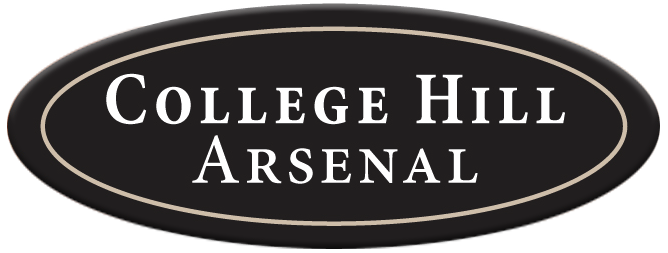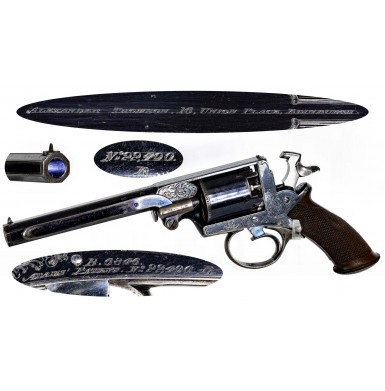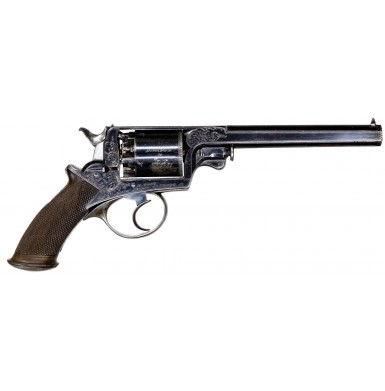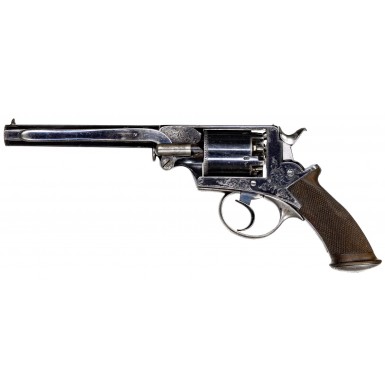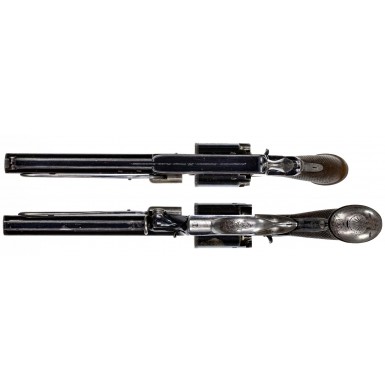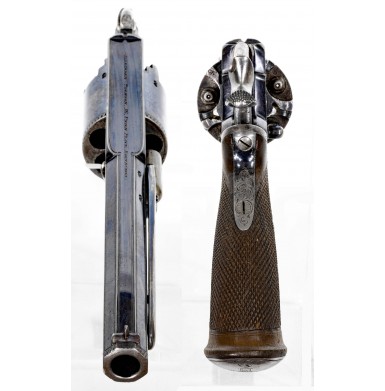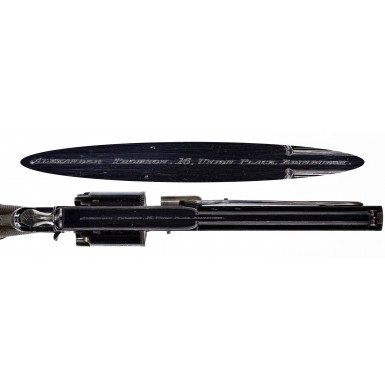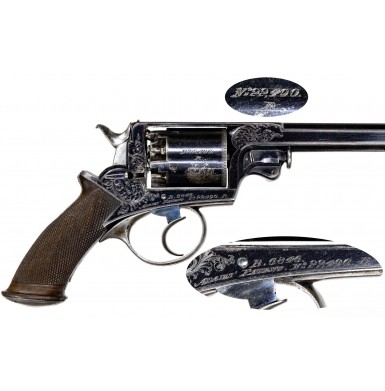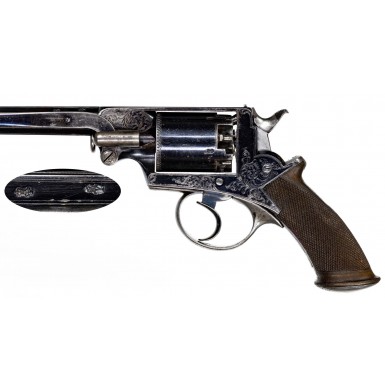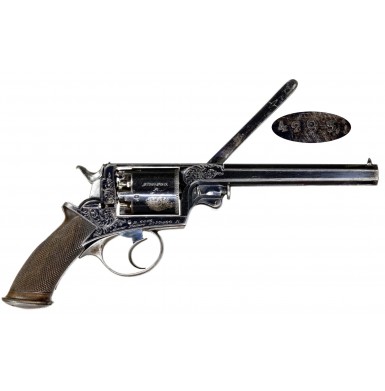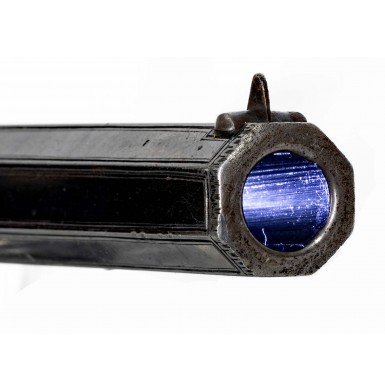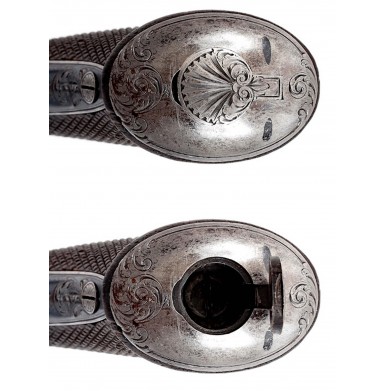Very Fine & Scarce Dragoon Sized Beaumont-Adams Model 1854 Revolver
- Product Code: FHG-JM129-SOLD
- Availability: Out Of Stock
-
$1.00
This is one of the rarest and least often encountered variations of the English Model 1854 Beaumont-Adams percussion revolvers, the 38-Bore (.50 caliber) Dragoon, a true hand cannon during its time. The massive revolver is 13 ½” in length and weighs in at a hefty lbs. 14oz, just shy of 3 pounds. Robert Adams and his licensees manufactured these revolvers under Adams’ solid frame patent. In 1851 Adams was granted a patent for significant improvements to revolvers by patenting a unique design with the barrel and frame forged as a single piece of steel. This made the pistol incredibly strong and was a much stronger system than any of the other revolver’s system then commonly in use, particularly those used by Colt which used a wedge to attach the barrel to the frame and had no top strap to reinforce the frame. Adams additionally received patents for a spring-loaded, frame mounted safety device and a spring-based cylinder arbor catch that were important features on his 1851 Patent revolvers.
These fine quality solid frame revolvers were as important to the history and development of the revolving handgun as were the developments and designs of Sam Colt. Adams additionally patented a self-cocking lockwork, which today would be referred to as “double action only”. This mechanism cocked the hammer, rotated the cylinder, and released the hammer, all as the result of a single pull of the trigger. While this allowed for rapid fire, the long, heavy trigger pull inhibited accurate firing. This action was the basis for Adams’ Model 1851 self-cocking revolvers. In 1854, Lt. Frederick Beaumont developed an improvement for Adams’ lockwork, which produced what would be called a traditional “double action” revolver today. The new lockwork allowed the revolver to operate in the fashion of Adams’ original design, but also added the facility to cock the revolver manually and fire it with a lighter “single action” trigger pull. This refinement allowed for more accurate shooting. In 1854 Adams also patented refinements to his original frame design by adding a sliding frame mounted safety on the right side of the frame and an improved cylinder arbor retaining mechanism as well. The resultant combination of design improvements was manufactured as the Model 1854 revolver, known to most collectors as the Beaumont-Adams revolver. This was the variant that was also produced under license by the Massachusetts Arms Company in America, as the Mass Arms Adams pocket revolver in .31 caliber and in a holster sized, .36 caliber version.
In Great Britain the revolvers were produced directly by Adams as part of his partnership with the London based Deane, Adams & Deane, as well under license by Birmingham makers like Joseph Brazier, Isaac Hollis & Sons. William Tranter also employed Adams solid frame in the production of his revolvers. Upon the dissolution of the Deane, Adams & Deane firm, Adams went to work for the London Armoury Company (circa 1857-1858), and his revolvers were produced there as well. Even after Adams left the London Armoury Company to reestablish his own firm, London Armoury continued to produce Adams’ patent revolvers at least until the early 1860s, well into the period when they were also manufacturing Kerr’s patent revolver.
Over the years it has been the 54-Bore (.443 caliber) Adams revolvers that have had the most association with the American Civil War, and little evidence has been available regarding the importation of the 38-Bore (.50 caliber) “Dragoon” sized revolvers. However, recent scholarship has uncovered that at least a handful of the .50 Adams revolvers were purchased and imported by the Confederacy and at least one dug example indicates that some of these pistols made it into the field. According to documents in the National Archives, eight cased Adams 38-Bore “Dragoon” revolvers were included in the cargo of the ill-fated blockade runner Elizabeth. The Elizabeth was owned by John Fraser & Co and was captured on 29 May 1862, while trying to enter the port of Charleston, SC. Listed in the cargo manifest was a case of revolvers, marked A within a rhomboid, and the case contained “eight Deane, Adams & Deane 8-inch revolvers, in cases complete”. The barrel length clearly indicates that these were the large-bore, .50 revolvers and not the more common 54-bore guns. The pre-war barrel markings suggest that these guns were purchased from existing inventory in English gun shops, likely by arms speculators, rather than the Confederate central government purchasing agents. Further indication that these large bore revolvers saw use during the war is a dug example with a 7 ½” barrel that was recovered near Brandy Station by a relic hunter in the 1960s. This dug example with its history and provenance sold from an Internet relic web site a few years ago. Additionally, a small number of .50 caliber M1854 Beaumont-Adams revolvers are known, in private collections, with the names of Confederate General Officers and staff officers engraved on the rights side of the pistol near the barrel to frame junction. One such example of an identified and engraved .50 Beaumont-Adams was auctioned at James D. Julia’s in March of 2014. That example was named to B. F. Ficklin. Lt. Colonel Benjamin Franklin Ficklin served as a staff & field officer during the war, initially with the 45th Virginia Infantry. He appears to have spent most of his service on detached duty in and around Richmond and had at least some involvement with the procurement of ordnance. It is believed by researchers that Ficklin was at least partially responsible for the acquisition of the .50 caliber Beaumont-Adams Dragoon revolvers that saw use with the officer corps of the Confederacy’s Army of Northern Virginia. Another example is known which is named to General G.C. Wharton, who commanded a brigade composed of the 45thVA and 56th VA at Fort Donelson. Obviously, the connection between Wharton and Ficklin is clear, as they served in the same brigade. Thus, the period documentation, and at least one field recovered example indicates that the Confederacy did purchase at least a few of these massive revolvers and some of them did see use in the field.
This Beaumont-Adams Model 1854 38-Bore Dragoon Revolver is in VERY FINE to NEAR EXCELLENT condition overall. The revolver is serial number No 22490 R, and the number is engraved on the right side of the frame, below the cylinder and on the cylinder itself. The revolver is also engraved on the frame with the Beaumont royalty tracking number B 6846, above the serial number. The frame marking reads:
B . 6846
ADAMS’ PATENT No 22490 R .
The top strap and barrel are engraved with the retailer’s name and address:
ALEXANDER THOMSON . 16 . UNION PLACE , EDINBURGH .
Alexander Thomson was a gunmaker and retailer who was located at the above Union Place address in Edinburgh, Scotland, from 1833-1869. As many of the best of the Confederate blockade-runners were built by the shipbuilders on the Clyde in Scotland, Scottish retailer marked guns from the mid-19th century are sometimes found with strong Confederate associations. While Adams patent revolvers are nearly impossible to date by serial number, the way you can those by Colt or Smith & Wesson guns, we can narrow the time frame for this revolver to circa 1855-56 for production. The revolver has the 1854 Beaumont improvements and has a Beaumont patent tracking number of 6846. This means that this was the 6,846th Adams revolver to be produced with Beaumont’s lock work. It is unlikely that more than 6,000 of the Beaumont pistols were produced the first year the system was adopted, due to process of tooling up for the new mechanism. As the pistol is not marked with any London Armoury markings, as it would have been as of 1857, this places the production of the pistol in the 1855-56 timeframe. The revolver has the assembly number 293 stamped inside the triggerguard bow as well as on the rear face of the cylinder and it is more than likely on other parts that can only be found be fully disassembling the revolver are marked in the same fashion.
As noted, the gun remains in really wonderful condition, and it retains the large majority of its original. The gun retains about 90% of its original bright blue throughout. The finish loss is mostly confined to the trigger guard, the butt cap, the sharp edges of the 7 1/8” octagon barrel, and a few small areas on the frame where the bluing has flaked. There is also a thumb sized patch of finish loss on the five-shot cylinder, below the serial number, where the metal was likely in contact with fabric for a long period of time, possibly in a case. The barrel is clearly and deeply marked with a pair of London commercial proof marks and the cylinder bears the same alternating London commercial proof and view marks between the chambers. All the original cones (nipples) are present at the rear of the cylinder and are in very crisp condition. They even retain their original brass spacers between the cone and the rear the cylinder. All the metal surfaces of the frame and barrel are smooth and in excellent condition with only a few flecks of minor surface oxidation and minute pinpricking scattered around the top strap and in the cone recesses of the cylinder. In typical Adams fashion, there is some well executed light foliate scroll engraving present on the frame, between the grip and the cylinder, and just forward of the cylinder at the barrel junction. The lower edge of the barrel web, the triggerguard and the buttcap are engraved en-suite and crisply engraved boarder lines are present along the sharp edges of the barrel with the muzzle and front edge of the cylinder being engraved with decorative borders. The bore of the revolver remains in about EXCELLENT condition as well and is quite bright, with wonderfully crisp rifling, and only some very lightly scattered pinpricking present along its length. The spurred hammer retains its original polished bright, “in the white” finish. The original Kerr’s Patent loading lever is in place on the left side of the pistol and operates perfectly. It rams smoothly and locks securely into place when not in use. The rammer retains about 70% of its original bright niter blued finish with strong purple tones with most of the wear and loss on the actual rammer and at the friction joint near the front of the cylinder. The reverse of the lever is marked 4293, the Kerr patent tracking number for royalty payments on the design. The Adams patent sliding safety is present on the right side of the frame and works exactly as it should. These safeties are often broken and missing. The safety retains about 70%+ of its original bright niter blued finish, with only some minor fading and finish loss, especially where the safety is handled to engage and disengage it. The Adams improved arbor pin retention thumbscrew is present and works exactly as it should as well. This is another small part that is often missing or broken. The original dovetail mounted front sight is present and in wonderful condition as well with the fixed notch rear sight machined integrally into the rear of the frame’s topstrap. The revolver is in mechanically excellent condition and functions flawlessly in all ways. The double action mechanism, timing, indexing, and locking up are all excellent and the revolver functions perfectly in single action mode as well. The butt of the pistol has a compartment to retain spare caps or cones. This is a feature most often encountered on the earlier M1851 self-cocking pistols and is not common on the later Beaumont-Adams designs. The grip also retains the earlier 1851 flare bottom silhouette, although the grip angle and curvature is more like the M1854 than the earlier M1851 revolvers. The one piece checkered walnut grip is in equally nice shape and rates about VERY FINE condition. The grip matches the condition of the revolver perfectly. The grip is solid and complete with no breaks or repairs. There is a tiny, hairline grain crack on the right side of the grip at the upper frame to grip juncture. There are also some minute surface chips of wood missing along the lower right edge of the grip, just below the trigger guard at the grip strap junction. These two minor issues are the only real condition issues with the grip at all. Otherwise, the grip retains crisp and sharp checkering, and shows only the usual handling marks and a few tiny dings.
Overall, the gun has a great visual presence and displays exceptionally well. This wonderful and rare large caliber Adams would be an outstanding addition to any collection of Civil War era or English percussion revolvers. It is in fantastic condition that is absolutely stunning and is in a caliber that is rarely found available on the collector market today. This is the exact pattern of revolver that has been identified to a number of significant Confederate officers and would be a wonderful example of the Adams “Dragoon” revolvers that many of them acquired. This is a very scarce gun that is rarely found for sale, especially in this condition, and it would surely make a wonderful centerpiece to any advanced percussion revolver collection.
SOLD
Tags: Very, Fine, Scarce, Dragoon, Sized, Beaumont-Adams, Model, 1854, Revolver
